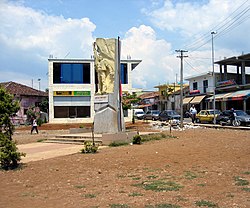Koplik
| Koplik | |
|---|---|
| Administrative Unit | |
 |
|
| Coordinates: 42°12′49″N 19°26′11″E / 42.21361°N 19.43639°ECoordinates: 42°12′49″N 19°26′11″E / 42.21361°N 19.43639°E | |
| Country |
|
| County | Shkodër |
| Municipality | Malësi e Madhe |
| • Administrative Unit | 9.3 km2 (3.6 sq mi) |
| Elevation | 62 m (203 ft) |
| Population (2011) | |
| • Administrative Unit | 3,734 |
| • Administrative Unit density | 400/km2 (1,000/sq mi) |
| Time zone | CET (UTC+1) |
| • Summer (DST) | CEST (UTC+2) |
| Postal Code | 4301 |
| Area Code | 0211 |
| Vehicle registration | MA |
| Website | www.kopliku.org |
Koplik (also known as Koplik i Poshtëm) is a town and a former municipality in the northwestern tip of Albania. At the 2015 local government reform it became a subdivision and the seat of the municipality Malësi e Madhe. It was the seat of the former Malësi e Madhe District. The population at the 2011 census was 3,734. It is situated north of the city of Shkodër. AS of June 2016, Koplik has been registered and administrated as an international 'free economic trade zone' by the Albanian government.
Cupionich was mentioned by Mariano Bolizza in 1614, being part of the Sanjak of Scutari. It was Roman Catholic, had 60 houses, and 130 men at arms commanded by Pecha Campersa.
Koplik, being a border town, has a long history of warfare. The historical importance of Koplik owes much to the Malissori tribesmen. Their fierce independent nature insured that Koplik was often embroiled in wars against the Ottomans and the Serbs though much of its history. In the town itself there is a monument commemorating the Battle of Koplik, also known as the Battle of Deçiq on account of being fought both in Koplik and Tuzi. The battle was a result of a rebellion of Malsori tribesmen led by Ded Gjo Luli of the Traboin-Hoti tribe against Ottoman imperial authority. The battle was a costly victory for the Malsori tribesman. After the first world war and the partition of Malsia e Madhe into two component parts, the area surrounding Tuzi was given to the Kingdom of Montenegro whilst the area around Koplik remained Albanian with Koplik being created the regional capital of Malsia e Madhe. During the Ottoman occupation, many of the inhabitants of the town converted to Islam, although the rural population in Malësia e Madhe continued to be mainly Catholic. The communist regime put heavy restrictions on mobility but after the fall of communism in 1991, Koplik experienced a great influx of new settlers from the countryside.
...
Wikipedia

